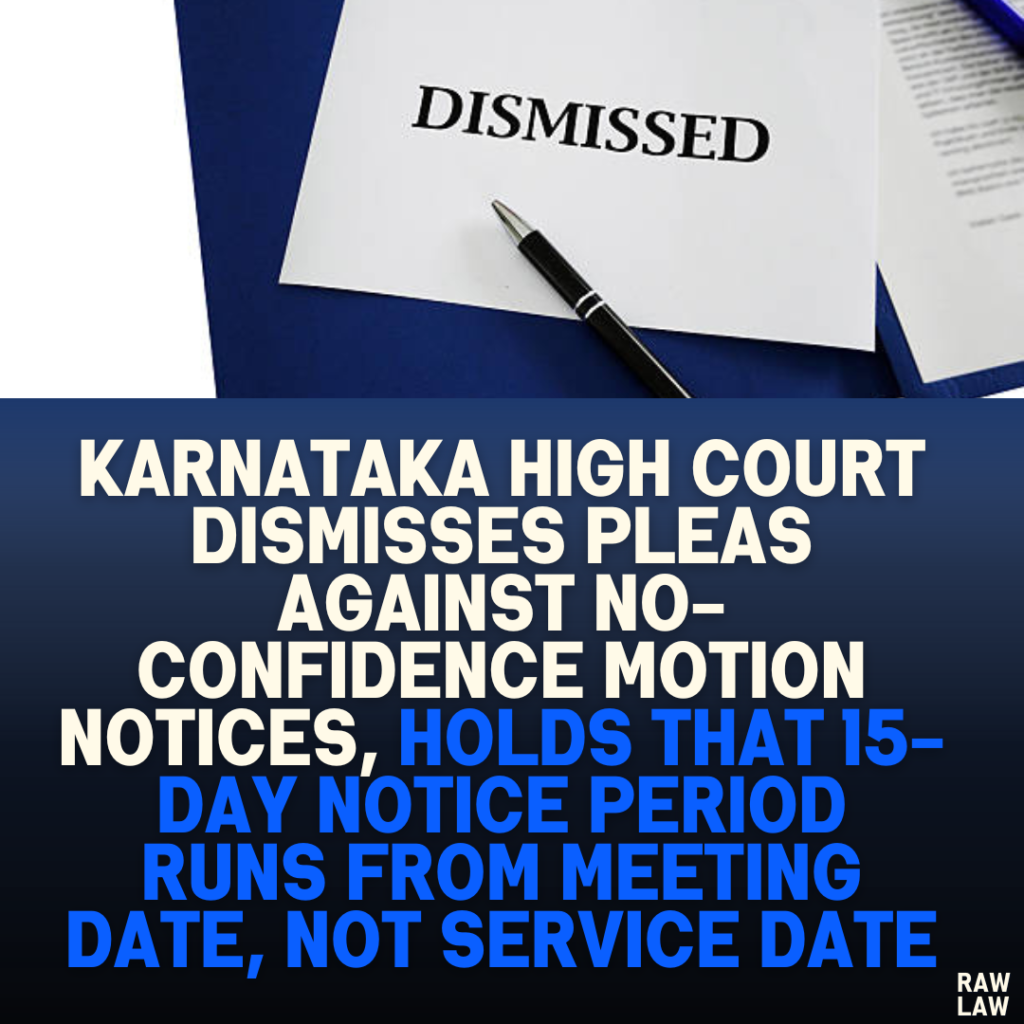Court’s Decision:
The Karnataka High Court dismissed two writ petitions filed against notices convening a special meeting of the Panchayat to consider a no-confidence motion. The court concluded that the notices complied with the relevant rule, which only requires a 15-day clear notice from the date the meeting is scheduled and not from the date when the notices are served on the members. As a result, the proceedings under the notices remain valid.
Facts:
- Writ Petition No. 31799/2024:
- Filed by a petitioner who was the subject of a no-confidence motion.
- The petitioner challenged the legality of the notice convening the Panchayat meeting, arguing that she was not given 15 days’ clear notice from the date the notice was served on her.
- Writ Petition No. 32470/2024:
- Filed by other members of the same Gram Panchayat.
- They also contended that the notice did not provide a 15-day clear notice from the date it was served on them.
Both petitions aimed to quash the notices issued by the Assistant Commissioner for convening the special meeting.
Issues:
- Primary Legal Question:
- Did the impugned notices violate the rule requiring 15 days’ clear notice?
- Sub-Issue:
- Should the 15-day clear notice period be counted from the date of service of the notice to the members, or from the date the meeting is scheduled?
Petitioner’s Arguments:
- Challenge to Notice Legality:
- The petitioners argued that the notices issued by the Assistant Commissioner were invalid.
- They claimed the notices failed to provide 15 days’ clear notice from the date they received (or were served) the notice.
- Violation of Rights:
- The petitioners emphasized that their rights were violated since they were not given sufficient time to prepare for the no-confidence motion meeting.
Respondent’s Arguments:
- Defense of Notice Validity:
- The respondents argued that the notices complied with the rules, which only require the Assistant Commissioner to provide 15 days’ clear notice from the meeting date, irrespective of when the notice was served on the members.
- Strict Rule Interpretation:
- They contended that the relevant rule does not mandate 15 days’ notice from the service date, but rather from the date of the meeting, which was followed in this case.
Analysis of the Law:
The court examined the rule governing no-confidence motions in Panchayats:
- 15-Day Notice Requirement:
- The rule mandates that a special meeting for a no-confidence motion must be convened with a 15-day clear notice from the scheduled meeting date.
- Notice and Service Distinction:
- The law does not specify that the 15-day period must begin from the date the notice is served on individual members.
- Instead, the obligation is on the Assistant Commissioner to ensure that the notice provides a clear 15 days from the meeting date.
- Statutory Interpretation:
- The court emphasized a plain reading of the rule, focusing on the exact wording that only connects the 15-day requirement to the meeting date.
Precedent Analysis:
- No Specific Precedents Cited:
- The judgment does not reference earlier cases.
- The focus was on interpreting the statutory rule governing no-confidence motion notices.
Court’s Reasoning:
- Rejection of Petitioners’ Argument:
- The court rejected the petitioners’ contention that the 15-day notice period must begin from the date of service of the notice.
- Clarification of Rule:
- The court held that the rule only requires a 15-day clear notice from the date of the meeting and does not mandate notice from the service date.
- Meeting Validity:
- Since the meeting date provided sufficient 15-day notice as per the rule, the court upheld the validity of the notices.
Conclusion:
The Karnataka High Court dismissed both writ petitions, holding that:
- The impugned notices were valid as they provided the required 15 days’ clear notice from the meeting date.
- All proceedings conducted under the notices remain valid.
Implications:
This judgment clarifies the interpretation of the 15-day notice requirement for no-confidence motion meetings in Panchayats. The decision underscores that the notice period is linked to the meeting date and not the service date. It ensures that such meetings cannot be challenged on procedural grounds of service timing unless explicitly stated in the rule.



